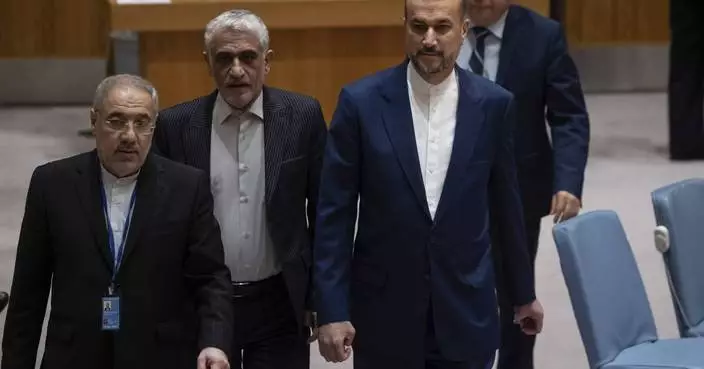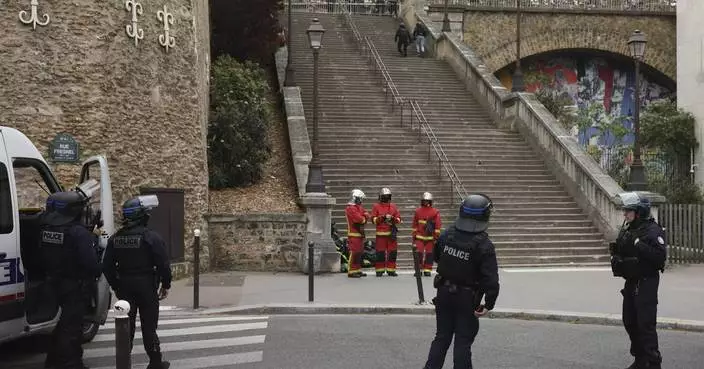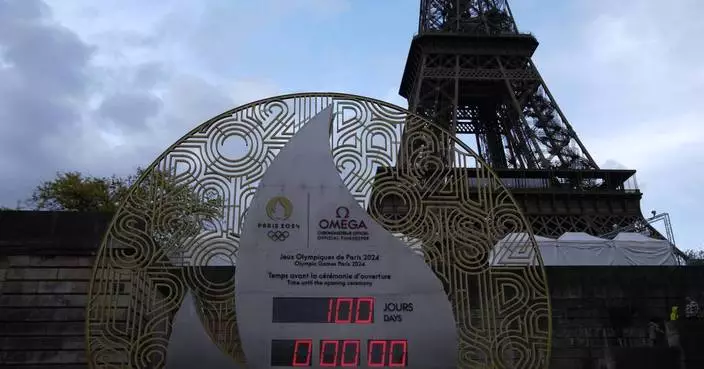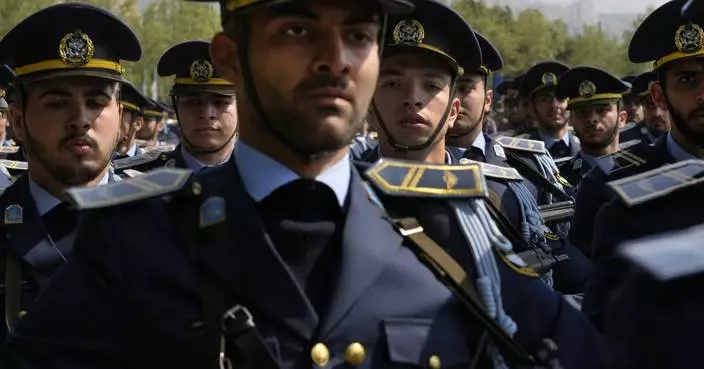Iran's parliament voted Thursday to elect a hard-line former mayor of Tehran as the legislative body's new speaker.
Iranian state television said Mohammad Bagher Qalibaf had been elected during a parliamentary session. It said 230 lawmakers voted for him, without saying how many of the body's 290 legislators voted against him.
Qalibaf was one of the challengers to President Hassan Rouhani in Iran's 2017 presidential election.
Qalibaf served in Iran's Revolutionary Guard during the country's bloody 1980s war with Iraq. After the conflict, he served as the head of the Guard's construction arm, Khatam al-Anbia, for several years.
He later served as the head of the Guard's air force.
During his 12 years as Tehran's mayor, Qalibaf improved the city's subway lines and encouraged the construction of many modern high-rises. His opponents accused him of wasting public funds on unnecessary projects while not paying attention to social and cultural aspects of the city.
Qalibaf, 58, replaces Ali Larijani, who served as the parliament's speaker from 2008 until this May.
JERUSALEM (AP) — Israel and Iran on Friday both played down an apparent Israeli airstrike near a major air base and nuclear site in central Iran, signaling the two bitter enemies are ready to prevent their latest eruption of violence from escalating into a full-blown regional war.
But the indecisive outcome of weeks of tensions — which included an alleged Israeli strike that killed two Iranian generals, an unprecedented Iranian missile barrage on Israel and the apparent Israeli strike early Friday in the heart of Iran — did little to resolve the deeper grievances between the foes and left the door open to further fighting.
“It appears we’re closer than ever to a broad regional war, despite the fact that the international community will most likely make a great effort to de-escalate tensions,” wrote Amos Harel, the military-affairs commentator for the Israeli daily Haaretz.
Israel has long considered Iran to be its greatest enemy — citing the Islamic Republic’s calls for Israel’s destruction, its controversial nuclear program and its support for hostile proxies across the Middle East.
These tensions have risen since Hamas and Islamic Jihad, Iranian-backed Palestinian groups, attacked Israel on Oct. 7, sparking a devastating Israeli offensive in Gaza that has continued for more than six months. Hezbollah, an Iranian-backed proxy in Lebanon, immediately began striking Israeli targets, opening up tit-for-tat fighting along a second front, while Iranian-backed militias in Iraq, Syria and Yemen have also fired missiles and drones at Israel throughout the war.
While Israel and Iran have waged a shadow war for years, mostly in neighboring Syria, they have largely avoided direct confrontations. That changed after an April 1 airstrike killed two Iranian generals at an Iranian diplomatic compound in the Syrian capital of Damascus. Although Israel did not comment, Iran blamed Israel for the strike and vowed revenge.
Iran responded with its first-ever direct attack on Israel, launching over 300 missiles and attack drones late Saturday night. Israel, working with a U.S.-led international coalition, said it intercepted 99% of the incoming fire, though a handful of missiles managed to land, causing minor damage to an Israeli military base and seriously wounding a young girl.
In Friday’s attack, Iranian state television said that air defense batteries fired in several provinces over reports of drones in the air. Iranian army commander Gen. Abdolrahim Mousavi said crews targeted several flying objects.
“The explosion this morning in the sky of Isfahan was related to the shooting of air defense systems at a suspicious object that did not cause any damage,” Mousavi said.
Authorities said air defenses fired at a major air base near Isfahan, which long has been home to Iran’s fleet of American-made F-14 Tomcats — purchased before the 1979 Islamic Revolution.
Isfahan also is home to sites associated with Iran’s nuclear program, including its underground Natanz enrichment site, which has been repeatedly targeted by suspected Israeli sabotage attacks. The apparent attack Friday came on Iranian Supreme Leader Ayatollah Ali Khamenei’s 85th birthday.
State television described all Iranian atomic sites in the areas as “fully safe.” The United Nations’ nuclear watchdog, the International Atomic Energy Agency, also said there was “no damage” to Iran’s nuclear sites.
Iranian officials made no mention of possible Israeli involvement. That could be intentional, particularly after Iranian officials for days have been threatening to respond to any Israeli retaliatory attack.
Israel also had no comment on the apparent attack, though one hard-line government minister, Itamar Ben-Gvir, hinted at his dissatisfaction, with a one-word tweet early Friday, using a slang word for weak or lame.
But Italy’s foreign minister, Antonio Tajani, said at a summit of Western leaders in Capri that the U.S. received “last-minute” information from Israel about the attack. U.S. Secretary of State Antony Blinken did not dispute that, but said: “We were not involved in any offensive operations.”
Yoel Guzansky, a former Iran expert in the Israeli prime minister’s office, said Israel appears to have carried out the attack to “check off a box” by sending a message to Iran without doing anything too provocative that could upset the United States, which had urged restraint, or spark further Iranian retaliation.
“It seems very limited, to send a message that ‘we can strike you inside of Iran,’” said Guzansky a senior researcher at the Institute for National Security Studies, a Tel Aviv think tank.
He said “the current round” of violence appears to be over, but that “nothing has changed” with Israel still facing Iranian-backed threats on various fronts.
“I see further rounds,” he said. And the next time, if Iran surprises Israel or allies don’t assist in Israel’s defense, “the outcome will be different.”
U.N. Secretary-General Antonio Guterres called for an end to the strikes.
“It is high time to stop the dangerous cycle of retaliation in the Middle East,” his office said.
Charles Lister, a senior fellow at the Washington-based Middle East Institute and a longtime regional analyst, challenged Iran’s claims that drones carried out the attacks. It appears instead that a small number of Israeli aircraft flew from Israel over Syria — striking at least two southern Syria military bases that have air defense systems along the way, he said.
They then entered Iraqi airspace, from where they fired a small number of Blue Sparrow air-to-surface ballistic missiles, likely without ever entering Iranian airspace, Lister said.
Accounts of explosions over Iraq support that scenario, and so does debris from what appears to be the booster of an Israeli-made Blue Sparrow missile that Iraqi security found in a field outside Baghdad, Lister said.
“In other words, the Israelis would never have needed to enter Iranian airspace to conduct this attack,” Lister said. "I think this was Israel’s way of just sending a message that we can reach you anywhere we want.”
If this latest round subsides, Israel can now return its focus to its ongoing war in Gaza and the simmering fighting with Hezbollah. With neither of those fronts letting up, the risk of further run-ins with Iran remains high, though neither side appears eager after Friday's apparent Israeli attack.
“Neither side is ready to jump over the brink," said Alex Vatanka, director of the Iran program at the Middle East Institute. But he added a major caveat.
“Probably we’re going to go back to the proxy war, “ he said, but now it’s a proxy war with the risk of “that sudden eruption of state-to-state war. Which we didn’t have to worry about before.”
Gambrell reported from Dubai, United Arab Emirates. Associated Press journalists Nasser Karimi, Mehdi Fattahi and Amir Vahdat in Tehran, Iran; Bassem Mroue in Beirut; Ellen Knickmeyer in Washington; Qassim Abdul-Zahra in Baghdad; and Nicole Winfield in Capri, Italy; contributed to this report.
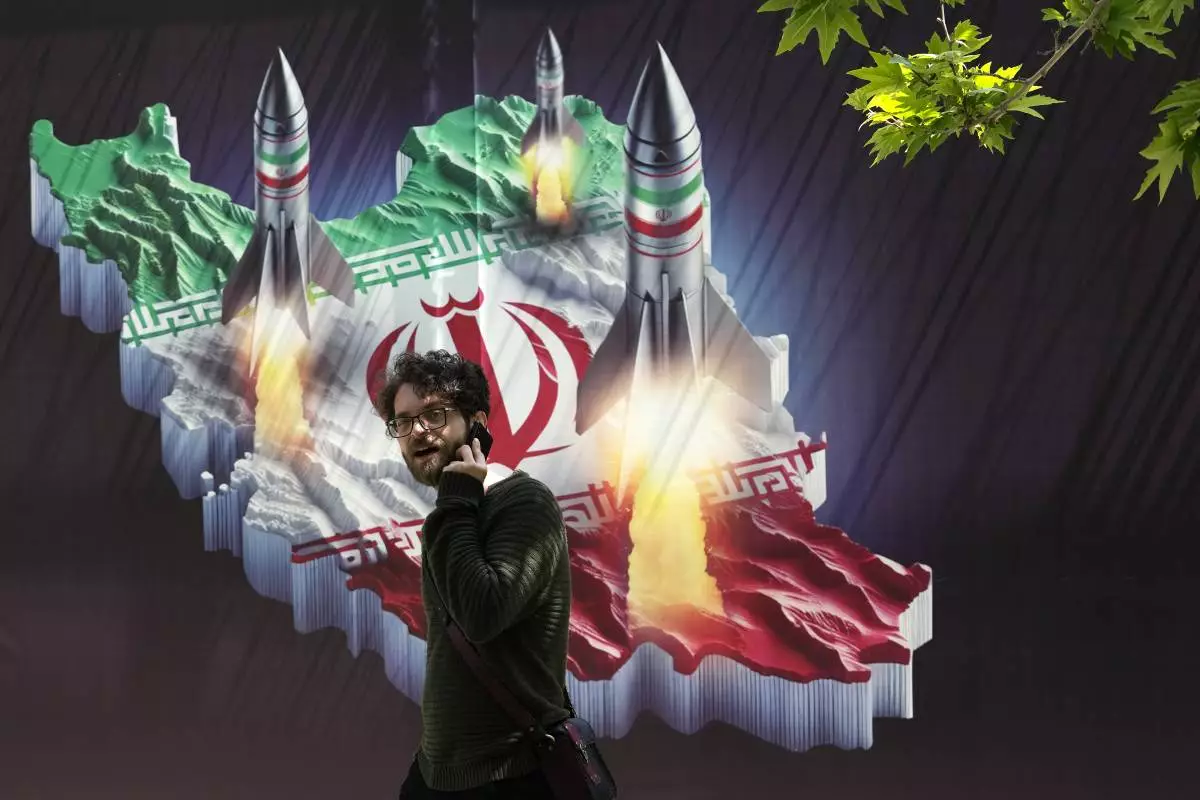
A passerby, taking on his cellphone, walks past a banner showing missiles being launched from Iranian map in northern Tehran, Iran, Friday, April 19, 2024. Iran fired air defenses at a major air base and a nuclear site near the central city of Isfahan after spotting drones early Friday morning, raising fears of a possible Israeli strike in retaliation for Tehran's unprecedented drone-and-missile assault on the country. (AP Photo/Vahid Salemi)
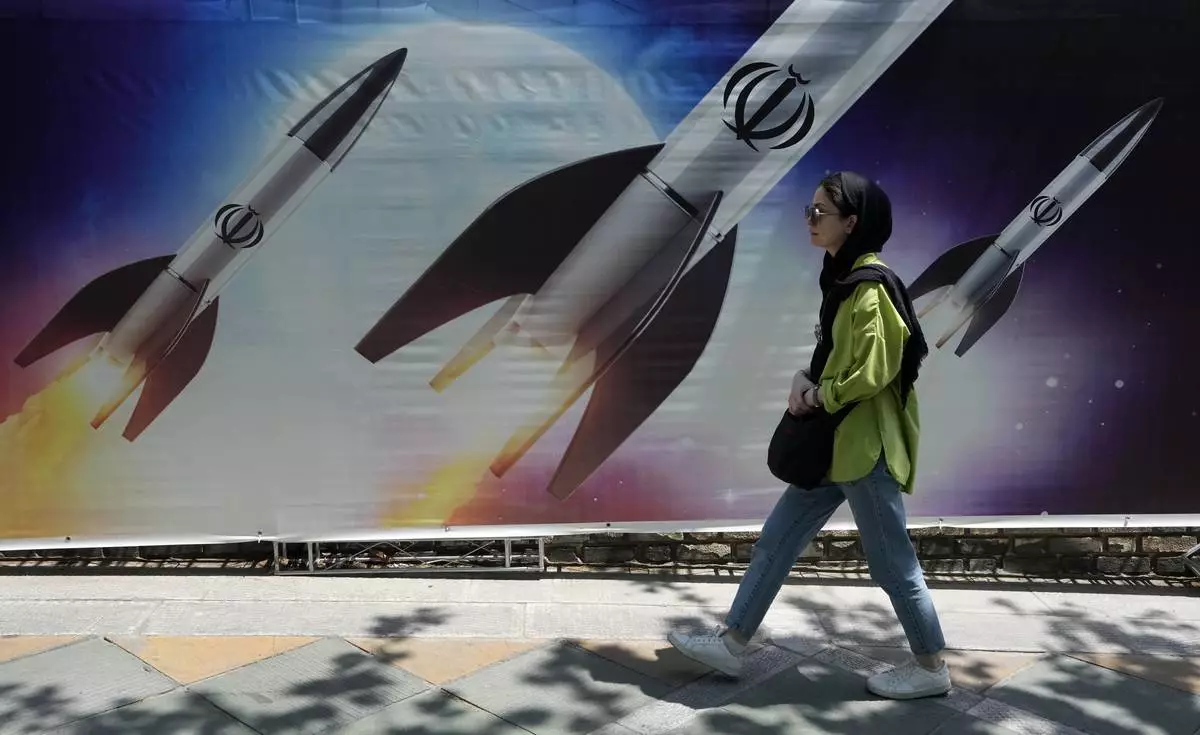
A woman walks past a banner showing missiles being launched, in northern Tehran, Iran, Friday, April 19, 2024. Iran fired air defenses at a major air base and a nuclear site near the central city of Isfahan after spotting drones early Friday morning, raising fears of a possible Israeli strike in retaliation for Tehran's unprecedented drone-and-missile assault on the country. On the missiles, a decorative sign reads: "Allah" (AP Photo/Vahid Salemi)
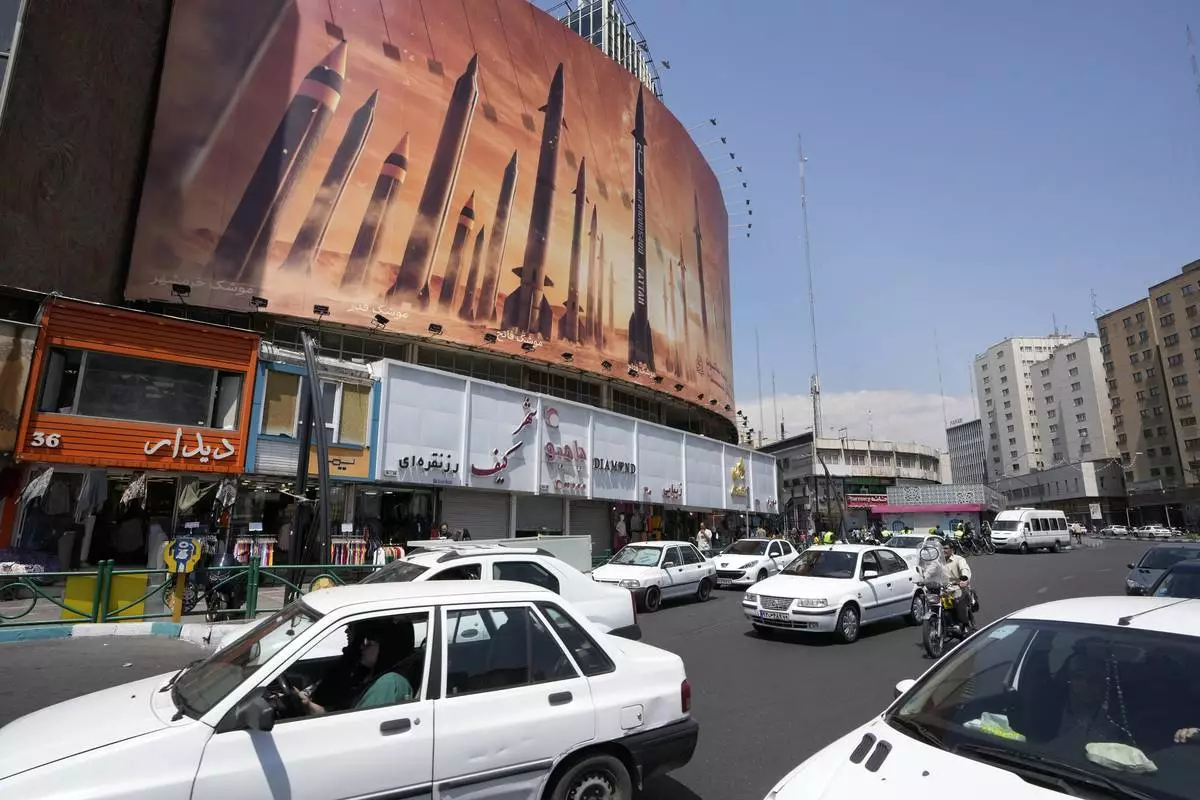
Vehicles drive past an anti-Israeli banner showing missiles being launched, in a square in downtown Tehran, Iran, Friday, April 19, 2024. Iran fired air defenses at a major air base and a nuclear site near the central city of Isfahan after spotting drones early Friday morning, raising fears of a possible Israeli strike in retaliation for Tehran's unprecedented drone-and-missile assault on the country. (AP Photo/Vahid Salemi)
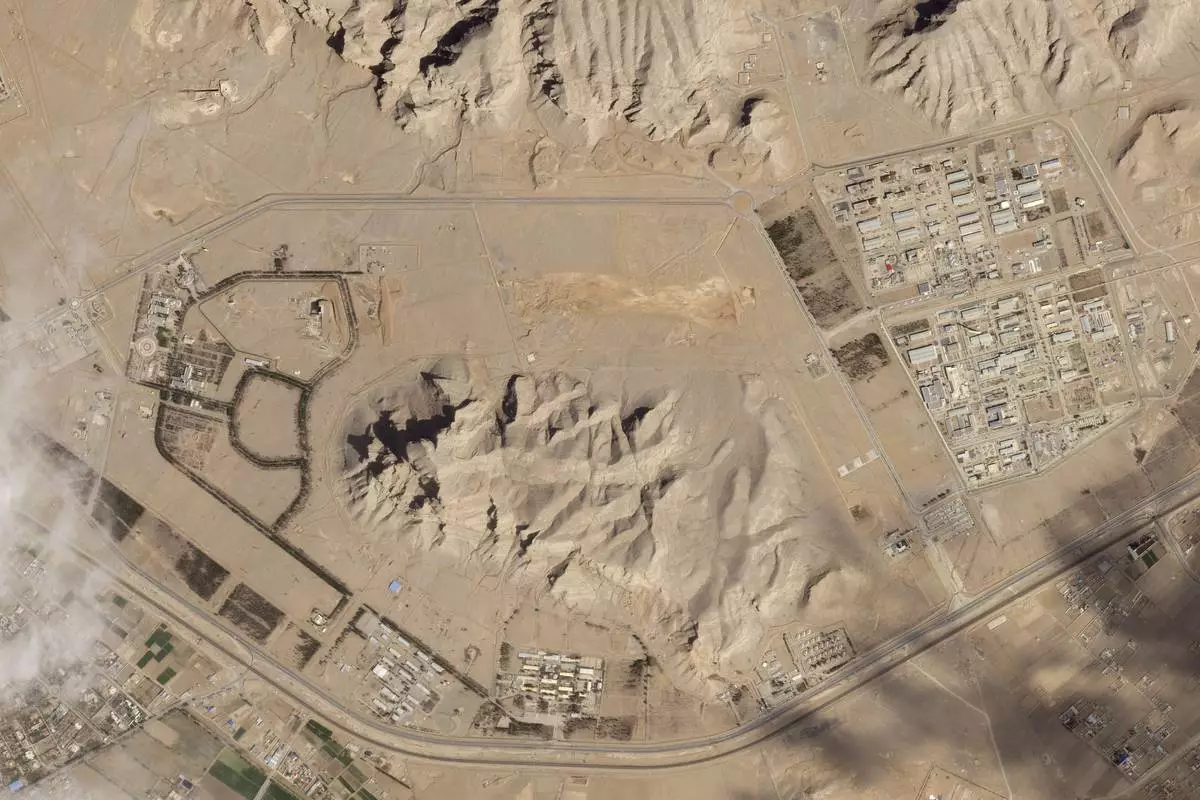
This satellite image from Planet Labs PBC shows Iran's nuclear site in Isfahan, Iran, April 4, 2024. Iran fired air defenses at a major air base and a nuclear site early Friday morning near the central city of Isfahan after spotting drones, which were suspected to be part of an Israeli attack in retaliation for Tehran's unprecedented drone-and-missile assault on the country. (Planet Labs PBC via AP)
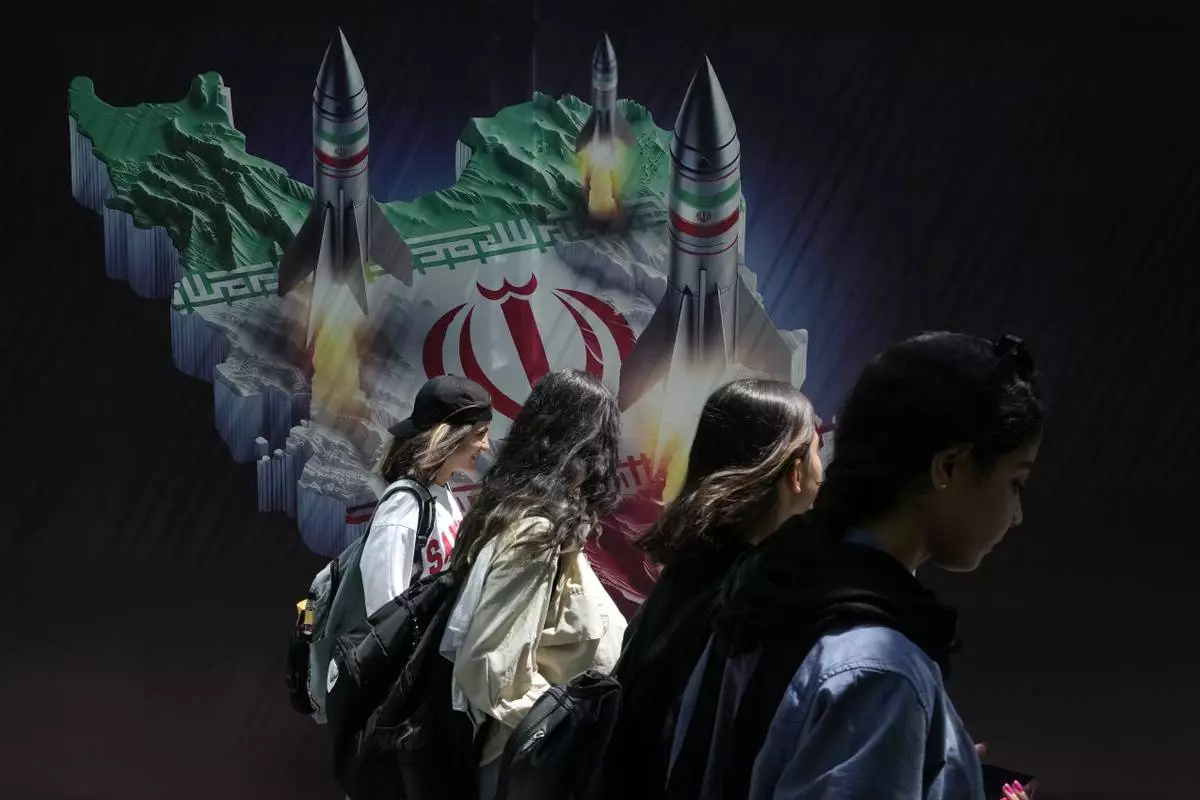
Iranian women without wearing their mandatory Islamic headscarf walk past a banner showing missiles being launched from Iranian map in northern Tehran, Iran, Friday, April 19, 2024. Iran fired air defenses at a major air base and a nuclear site near the central city of Isfahan after spotting drones early Friday morning, raising fears of a possible Israeli strike in retaliation for Tehran's unprecedented drone-and-missile assault on the country. (AP Photo/Vahid Salemi)








